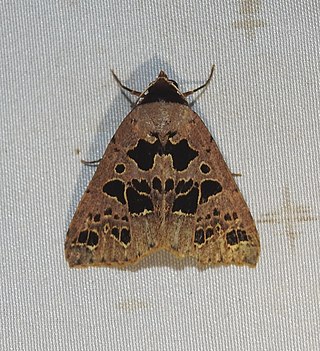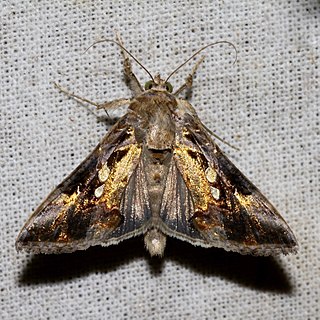
Mocis frugalis, the sugarcane looper, is a moth of the family Erebidae. The species was first described by Johan Christian Fabricius in 1775. It is found in several parts of the world, including India, Sri Lanka, West African countries and other Oriental regions. The adult is a fruit piercer and a major pest of crops.

Pachnoda sinuata, the garden fruit chafer or checkers tor or brown-and-yellow fruit chafer, is a species of beetle found in Namibia, South Africa and Egypt.

Lomographa bimaculata, the white-pinion spotted, is a species of geometer moth. It belongs to the large geometer moth subfamily Ennominae, and therein to the tribe Baptini. It is – under its junior synonym – the type species of its genus Lomographa. It is also the type species of Bapta, a junior objective synonym of Lomographa and the namesake of the Baptini. The species was first described by Johan Christian Fabricius ion 1775.

Thysanoplusia orichalcea, the slender burnished brass, is a moth of the family Noctuidae. The species was first described by Johan Christian Fabricius in 1775. It is a polyphagous pest of vegetable crops that originated in Indonesia, from where it spread to Europe, South Asia, India, Sri Lanka, Africa, Australia and New Zealand. In northern Europe it is a migrant species.

Anoba is a genus of moths of the family Erebidae. The genus was previously classified in the subfamily Calpinae of the family Noctuidae, but now is classified as part of the subfamily Anobinae, of which Anoba is the type genus.

Laspeyria is a genus of moths of the family Erebidae erected by Ernst Friedrich Germar in 1810.

Argyrogramma signata, the green semilooper, is a moth of the family Noctuidae.

Grammodes stolida, the geometrician, is a moth of the family Erebidae. The species was first described by Johan Christian Fabricius in 1775. It is found in Africa, southern Europe, most of Asia and Australia. It migrates to central and northern Europe as far north as England, Denmark and Finland.

Serrodes partita, the catapult moth, is a moth of the family Erebidae. The species was first described by Johan Christian Fabricius in 1775. It is found in western, eastern, central, and southern Africa, India, Indonesia and Sri Lanka.

Euchromia lethe is a moth of the subfamily Arctiinae. It was described by Johan Christian Fabricius in 1775. It is found in Angola, Cameroon, the Republic of the Congo, the Democratic Republic of the Congo, Equatorial Guinea, Guinea-Bissau, Madagascar, Niger, Nigeria, Senegal, Sierra Leone, South Africa, São Tomé and Principe, the Gambia and Uganda.

Achrosis rondelaria is a moth of the family Geometridae first described by Johan Christian Fabricius in 1775. It is found in India, Sri Lanka, Myanmar, Java and Nepal.










